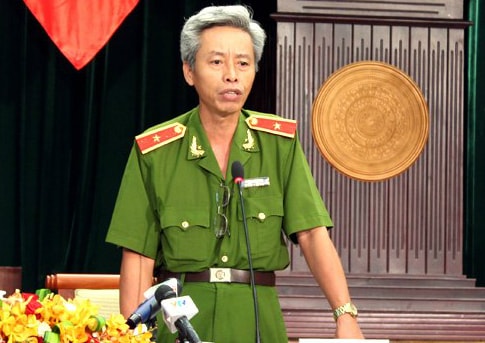General Phan Anh Minh: '50% of smuggling cases have customs' influence'
The Deputy Director of Ho Chi Minh City Police said that the import and export of goods has the highest potential risk of corruption, with 50% of smuggling cases in the area "involving customs officers".
At the conference summarizing the work of preventing and combating corruption and waste in 2015 organized by the Ho Chi Minh City Party Committee on the afternoon of March 8, as the person who has been involved in the most corruption cases in the city's police force, Major General Phan Anh Minh - Deputy Director of the City Police Department said thatAnti-corruption detection can not be said to be less or more.
"That assessment is emotional and speculative, the nature of corruption cases is latent,Which cases are investigated 80% of the time?"It was a success beyond expectations," Mr. Minh said, adding that the subsequent corruption cases often caused greater damage than the previous ones, even much greater, and that the detection rate was very slow. There were acts that occurred 3 years, sometimes 5 or 10 years before being detected, so recovering assets was very difficult and asset dispersion was terrible.
 |
Major General Phan Anh Minh - Deputy Director of Ho Chi Minh City Police. Photo: HC |
According to General Minh, the current anti-corruption work has not met the requirements. The City Party Committee's Internal Affairs Committee asked the City Police to explain why corruption cases discovered by the City Police through investigation are few. "I would like to say frankly that there are not few, but none because we have to comply with Directive 15. Most of the subjects causing corruption are party members, and the police are not allowed to organize investigation of party members. Therefore, corruption cases discovered by the City Police must be through other economic cases," Mr. Minh said frankly.
The Deputy Director of the City Police also said,Current solutions are not enough to prevent corruption. Some measures are illusory, such as asset declarations.He cited evidence from his agency where more than 1/3 of cadres and civil servants have to declare their assets "but after doing so, they just put it in a drawer and keep it." Whether it is correct or reasonable, no one knows.
"We must gradually make it public and transparent. Management officials must conclude whether the annual declaration is appropriate or not. If there are any inconsistencies, we must request additional information on the origin, income... and even have sanctions and handling," Mr. Minh suggested, saying that asset declaration must be a measure to prevent corruption, and a declaration left in a desk drawer has no meaning at all.
According to General Minh, there are currently5 areas with high risk of negative impacts, of which the top is the import and export of goods sector., 50% of smuggling cases in the city are behind the shadow of customs officers. The banking and finance industry is also hiding a number of cases that can be prosecuted, the remaining problem is to evaluate its impact on the financial industry. "N"We currently have signs of financial capital monopolization, possibly monopolizing a part of the management," Mr. Minh assessed.
Although he has handled many cases, Mr. Minh said that there is no need to be proud because the processing is very slow. Among the types of cases that are returned for investigation or for further investigation, corruption cases are at the top. There are even cases that have been reinvestigated 3-4 times, and the cancellation rate is also high. "The reason for this situation is that prosecutors at all levels are very cautious and perfectionist when dealing with corrupt people," he explained.
According to Mr. Minh, the city is also stuck with the mechanism of authorizing prosecution in the court and the procuracy. That is, the entire investigation process is done by the central government, other agencies do it and then transfer it to the city for trial. Meanwhile, the case files of those cases are under 20,000 pages, which is too little, but usually several hundred thousand pages, no jury can study them in 2 months to bring them to trial.
"Such slow and long processing has resulted in people's waiting and trust. People even doubt why it takes so long to try, or if the sentence is overturned, or if the next sentence is more lenient than the previous one. There are many cases where the city overturned the sentence, but in my heart I do not believe it, eroding people's trust," Mr. Minh said frankly.
According to VNE
| RELATED NEWS |
|---|

